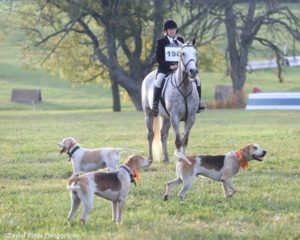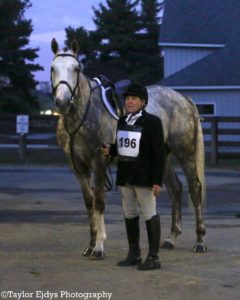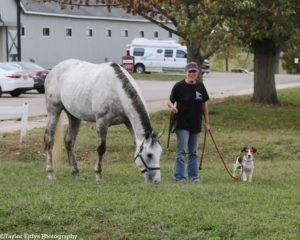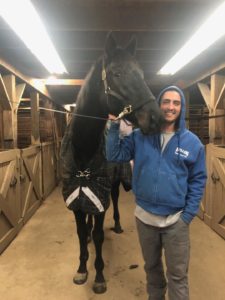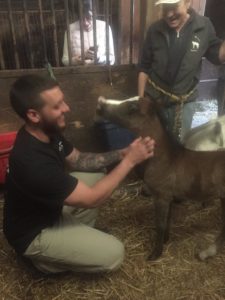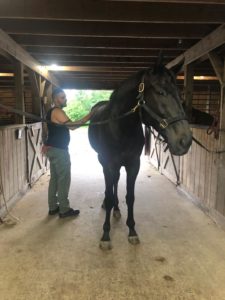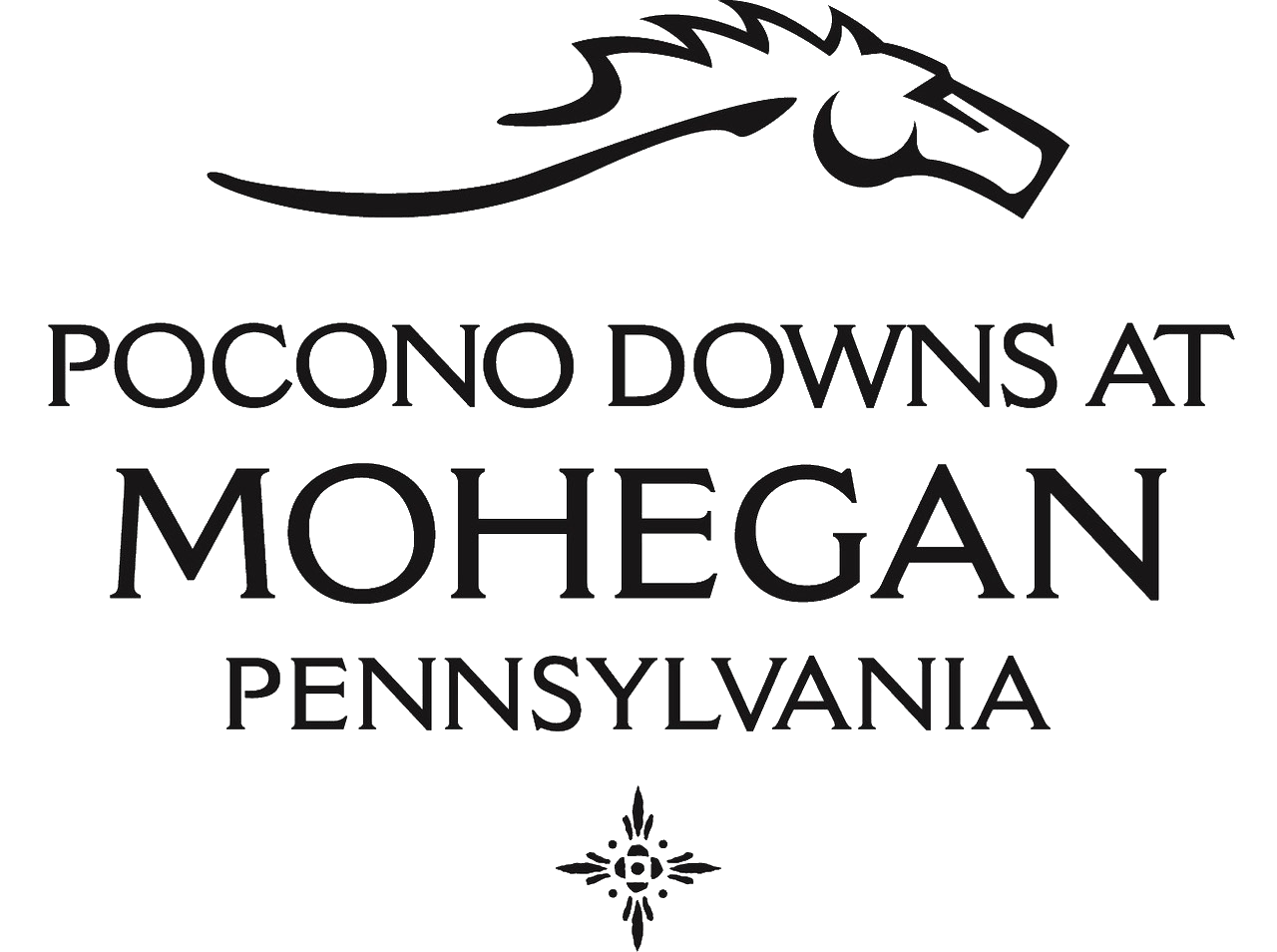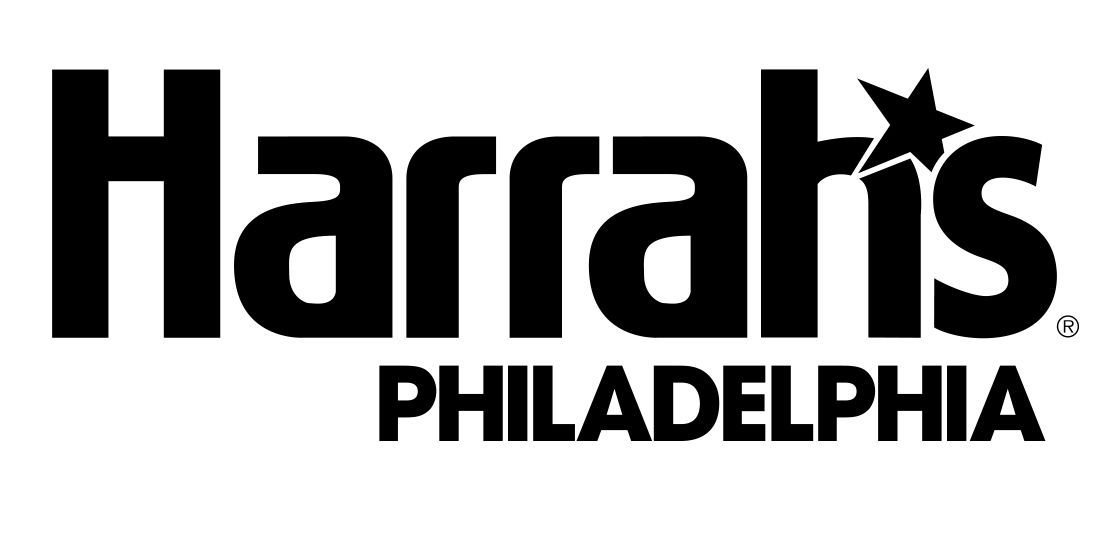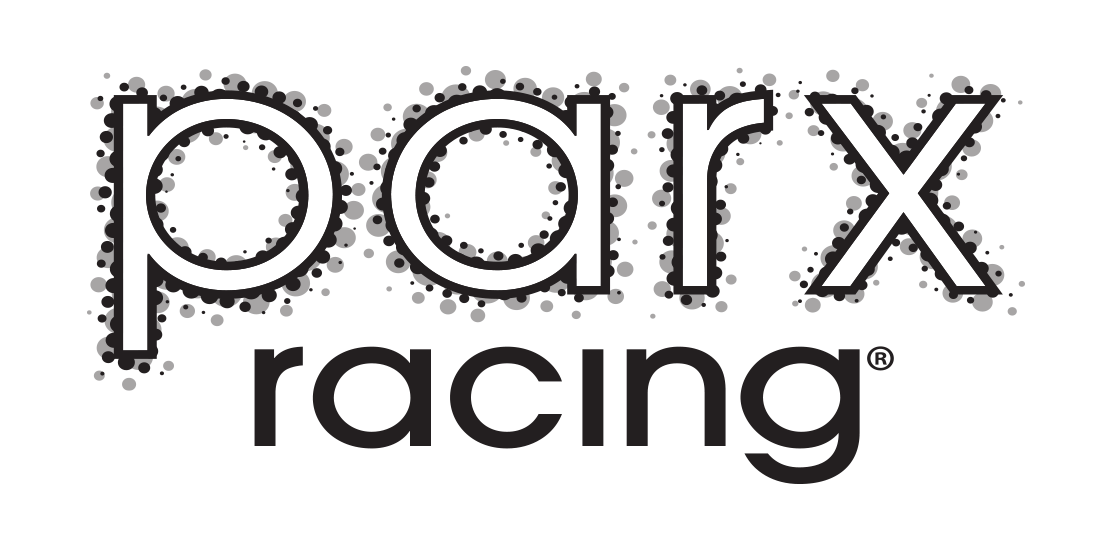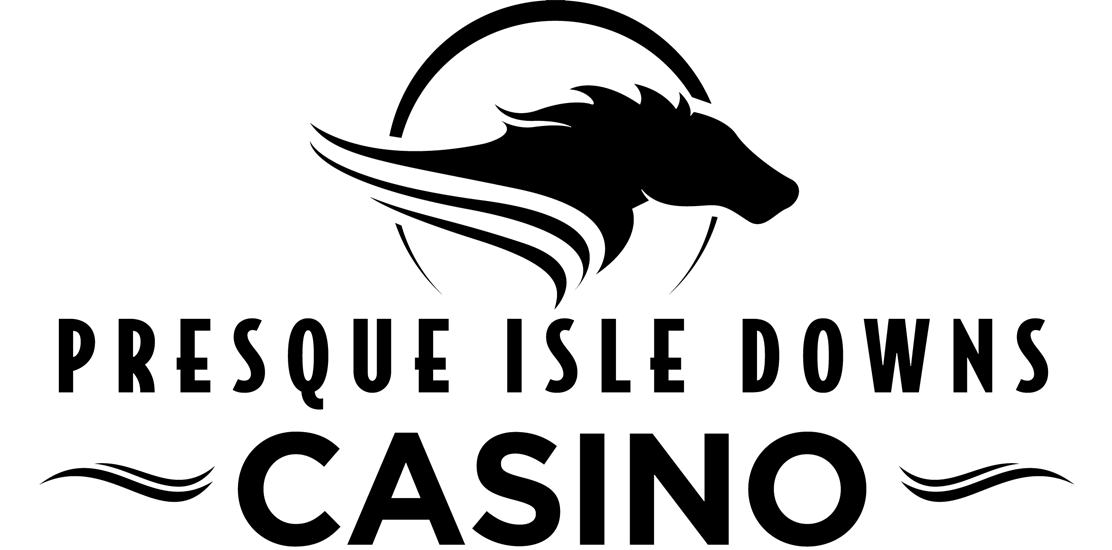“There is a wisdom in . . . a man’s own observation, what he finds good . . . is the best … to preserve health.” –Sir Francis Bacon in Of Regimen of Health
Fifty-plus miles north of Philadelphia (in Perkasie, Bucks County, Pennsylvania), Kate Goldenberg brings horses and humans together for the mutually restorative mind, body, and spirit health experience at Safe Haven Equine Rehabilitation farm.
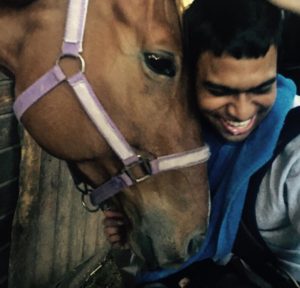
Kate Goldenberg is a US Jockey Club licensed owner and trainer whose mantra is “horses can do their best by feeling their best.” A key ingredient, she believes, is turn-out time and fresh air away from the fast-paced energy of the racetrack. Time has proven farm living is a healing force for the caretakers as well as the horses!
At Safe Haven Equine, the Thoroughbred racehorse trainer provides schooling so young horses start their careers as well-conditioned, confident athletes. Additionally, at Safe Haven Equine, standing at stud is “PA Top Fifty” Thoroughbred stallion—Show Tune by Unbridled’s Song.
Experienced on-site staff equipped with closed-circuit TV monitoring equipment ensure mares are escorted safely from breeding through pregnancy and delivery keeping within PA Breeders Association regulations to guarantee PA Bred bonus purse qualifications.
One of Goldenberg’s Pennsylvania home bred horses, Saratoga Jack, is infusing funding into the farm via The PA Horse Breeders Association.
Brian Sanfratello, Executive Secretary of PHBA and a PHRA Board of Directors member explains, “Breeders get funding from the Racehorse Development Fund that pays for breeder awards, restricted races, and owner bonuses throughout the state. The program has expanded greatly over the past couple of years. The numbers of mares bred and registered foals are on the increase with a promising future for Pennsylvania breeders and owners.”
Retired Racehorse Project Thoroughbred Makeover Competition
While Goldenberg successfully breeds racehorses and trains youngsters to win at the races, her farm is open to good people with good intentions (towards retired-from-racing racehorses). As a result, Safe Haven Equine now endures as a sanctuary with restorative healing properties for both horses and humans.
The Hero: Adopting a Horse’s Perspective Secures a Soldier’s Life
“We’ve had some remarkable experiences over the years,” says Goldenberg. “Racehorse owners love their horses and want them to retire into a great situation. Contrary to what media and some groups portray, people want their racehorses to have a happily-ever-after life. They’ll pay out a lot of money to fix a fracture, even on an older horse, knowing full-well the horse will never race again.”
“Years back, some racehorse owners had contacted me about a big (17.2 hands high), black, Thoroughbred horse that had earned a half-million dollars. His name was YouGotThatGoinForU. He was quite the character with personality. He was very affectionate, and therefore very place-able. He had a partial bone fracture, and knowing he’d never be able to race again, the owners opted to pay for reconstructive surgery to make him sound so he could happily live out his days in semi-retirement—functioning as a whole-healed horse, just not functioning at the high speeds required to race,” shares Goldenberg.
“This horse is ended up saving a soldier’s life!”
“A highly-decorated, marine combat-veteran came to the farm as a volunteer to work with the horses. Because of what’d he’d seen on the battlefield and the hell he’d experienced firsthand on tours, he was struggling with anger issues over the prejudice, injustices, and hellacious things he’d witnessed in service to his country,” muses Goldenberg.
“It was a big turning point for him when he started working with the big black racehorse that I renamed Radar. The big milestone for this marine vet was when he started to groom horses and then, started to get involved with Radar,” says Goldenberg.
“The thing about horses is the trust-relationship they example and build. They don’t lie. They don’t cheat. They don’t have a deceitful, ulterior motive, and they communicate honestly. While grooming, if you brush too hard, they let it be known. Their expressions are free, and they wear their heart on their sleeve,” says Goldenberg.
“Experiencing that level of honesty is grounding, healing, and restores. To experience the genuineness of a horse with character is amazing.”
Goldenberg says, “Radar’s leg was in the healing stage, and he was adjusting. I told the veteran, ‘That horse is like a soldier. He is always going to do the best he can no matter the risks. He’s a lot like you’.”
That was when the military veteran confided, “Radar was my service nickname in the marines.”
Between Kate and the US veteran, there were a lot of quiet, ah-ha teachable moments working together on the farm. Says Goldenberg, “When we’d watch a young Thoroughbred colt all full of himself and just wanting to jump willy-nilly on everyone and everything in total, reckless abandon and with no respect for other horses, I told him, ‘We’re all animals. It’s just his base animal behavior’.”
He said, “I find it so helpful to just back up, pause and say, we’re just animals. I found it, finally. I’d get so angry at prejudice and people’s behaviors, but we’re animals. They’re animals. The one horse doesn’t like the other horse, so he bites them in the butt.”
Goldenberg notes that working with horses changes your perspective on prejudice, “Often a horse will bully the new arrival horse just as kids do in school, or a horse will show prejudice on color.” says Goldenberg. “There’s not really any explanation for it. It’s just animal behavior. When you take things down into simple animal behavior, it relaxes people’s expectations of other people.”
“It really helped that US military veteran become less angry and with fewer expectations,” says Goldenberg. “He ended up adopting Radar and taking him to his farm. It turned into a happily-forever-after story for both of them.”
The Horses: Retraining for Second Careers and Finding Forever Homes
Kate started picking up racehorses and retraining them for after-racing careers many decades before “rescue” was fashionable. Back before the creation of Turning for Home racehorse rehabilitation, back before fashion icon Ralph Lauren joined forces with the Work to Ride program in Philadelphia, Kate Goldenberg took the personal initiative and out-of-her-own-pocket purchased retired-from-racing racehorses to give them a new profession.
“It was a whole different world [back then],” reminisces Goldenberg. “I paid money for horses to give them a new career. Nobody ever thought of it as ‘rescue‘ back then. I think it’s a wonderful thing [now] that people are aware and proactive. Everybody is into it. Now, it’s fashionable to be a rescue.”
The Healer Helpers: A World of Helping Hearts
“The advantages of being a ‘rescue’ is the great people that come to join you. It brings a lot of volunteers,” reveals Goldenberg. “The world comes to you in herds. There have been so many great people that I never would have met had they not said, ‘here’s a location that I can get to and help’.”
“There’s something about the term ‘rescue’ that makes people feel helpful right off the bat,” admits Goldenberg. “It’s a very powerful word that draws people to the farm. It’s a win-win situation for both the horses and the people that help. Often people are doing ‘rescue work’ as self-therapy. Veterans, school teachers, doctors, professors, and children . . . just enumerable people have all stated how much better they feel being on the farm.”
Said one former volunteer, “Kate’s a wonderful person and treats everyone with kindness. I have nothing but fond memories of that place.”
The Haven: Judgmental Free Zone & Pleasant Path between Professions
“At Safe Haven Equine, working with horses and watching, experiencing, and even studying their herd interactions opens up so much understanding for people. Children, veterans, professors, corporate executives, doctors, and therapists have all come as volunteers and say how much healing power the farm experience gives back,” testifies Goldenberg.
“The healing power of the farm, really, is that it’s non-judgmental. For volunteers, there’s no schedule; it’s just easy and a laid-back place to sleep, to eat, to heal,” says Goldenberg smiling.
Safe Haven Equine has been responsible for the safe placement of hundreds of horses.
Safe Haven works with the race tracks, trainers, and rescue organizations to facilitate horses leaving racing and transitioning into a new profession in a loving home. Rescued horses are brought to the farm where their physical needs are assessed and addressed while they enjoy a well-earned rest.
Once the physical issues are addressed, their abilities, attitudes, athletic aptitudes, and agility are evaluated to determine re-schooling and a career path in any of multiple venues:
- Companion
- Dressage
- Eventing
- Family Pets
- Fox Hunters
- Hunter-Jumpers
- Pleasure
- Polo Ponies
- Trail Riding
Horses are carefully matched to new owners to ensure loving, secure, forever placements.
Safe Haven works with Turning for Home and is a proud friend and supporter of the Work to Ride program of Philadelphia PA.
Follow Safe Haven Equine farm at: Facebook.com/SafeHavenEquineInc.
*Safe Haven Retired Racehorse Thoroughbred Makeover Project photos courtesy of Taylor Ejdys Photography
